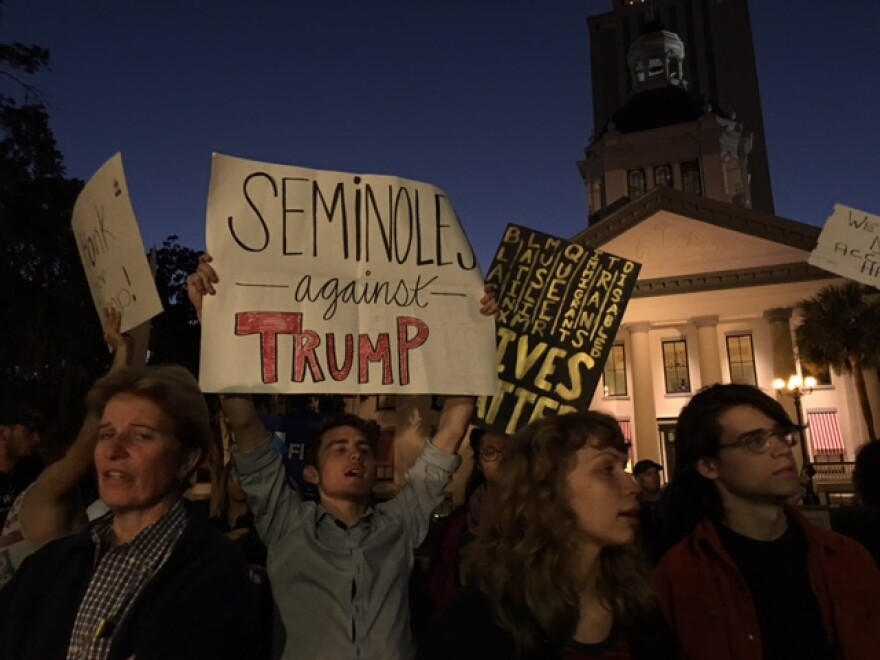A Donald Trump presidency is raising concerns about First Amendment protections. Trump has accused the media of bias, limited access during his transition and spoken out against protesters. Meanwhile, the social media site Twitter purged hundreds of users associated with white supremacy. But what does the U.S. Constitution actually say about the right to free speech, expression and assembly?It’s been just a few weeks since Donald Trump was elected President of the United States and protests like this Tallahassee rally have occurred across the country. Ana Gomez, a Florida State University student, says in her native country of Cuba, rallies like this aren’t allowed, which is why she worries there could be a crackdown under the incoming administration.
"It’s not so much the problem of what Trump would do; what a Pence vice presidency would do,” Gomez said. “It’s more of the, what Mitt Romney called ‘trickle down violence’—the thing that there might not be accountability in places were there would be accountability before to deal with violence in our communities.”
Across the street, there’s another rally.
Military Veteran Jay Mears is with a smaller group on the other side of the street. Mears said, “I’m counter-demonstrating a protest, any Trump protest, exercising my First Amendment rights to counter-protest. And do it peacefully.” Both groups are exercising their First Amendment rights. Mears is not pleased about it, but as Rich Templin notes, the First Amendment protects both those who agree, and those who don’t. Templin is the Legislative and Political Director of the Florida AFLCIO.
The First Amendment is what guarantees our ability to say, you know, our president stinks and is doing a terrible job.
“It also is what guarantees the rights of our oppressed and our media to hold the media to hold government accountable and to serve as a watchdog,” Templin said. “It ensures that there is no establishment of a state religion, something that is connected to government.”
But, Templin says certain First Amendment protections, such as the freedom of speech, don’t mean freedom from consequence.
Templin continued, “I don’t think we’ve seen that, at least with the Trump campaign, and now with the Trump administration, not willing to accept that when you are saying ‘these people are bad, as a class’ or ‘these people should be banned, as a group, or as a class’ and then supporters go out, and act on that, and act as if these people are less than human, act as if these people pose a fundamental security challenge to the United States. And then nobody takes responsibility for it. It’s just, ‘oh, well that’s just a troubled individual who was violent.’ I think that everybody has to take responsibility for what they say out loud in public.”
Templin worries more about the clash of religion. Ongoing wars in the Middle East coupled with high profile terrorism attacks have generated a backlash against Muslims. The Supreme Court’s decision to back gay marriage has been met with religious protection bills in state legislatures that some argue allow discrimination rather than protect against it.
“Let’s say we did have prayer in school. What prayer would it be?” Templin asked. “Which denomination would control the prayer that was allowed? Let’s say that we did continue to blur the lines between Church and State. That would inevitably lead to one set of beliefs winning out over other sets of beliefs. That’s what this First Amendment was for, was to say, ‘hey, we’re gonna keep religion out of the state because there will always be winners and losers, and we don’t want people of faith to be losers. We just want the government to stay out of it, that way, they are protected.”
Francine Huff, a journalism professor at Florida A&M University worries access to information is being eroded. She believes President Elect Donald Trump’s restriction on media access coupled with his use of social media could become a problem.
“The news industry as a whole has been struggling in recent years with exactly what is the future of the media industry,” Huff said. “I think that the Trump presidency is a game changer, I think his social media is something that has to be watched going forward—it certainly play a large role in his campaign.”
Much of the campaign discourse as well as transition information is coming through the use of twitter. And the company made headlines when it booted users it says are associated with the Alt-Right. The move struck free speech advocates as wrong, but, American Civil Liberties Union Attorney Esha Bhandari says it’s important to understand the First Amendment protects against government action to restrict speech or protest.
Huff notes, twitter is a private company, saying, “Private individuals remain free to engage in certain actions that the government cannot do when it comes to shutting down speech.”
Bhandari says that in her line of work, it’s not about what she or her colleagues consider right or wrong--the ACLU stands behind the fundamental components of the First Amendment at all costs.
The ACLU will often represent groups that convey a message that we don’t agree with, but because the principle is so important we think it's critical to stand up against government power and censorship in whatever form it takes.
The First Amendment protects you from having a religion imposed on you, just as it protects you to practice your own religion. It allows for people to assemble and protest. It protects freedom of speech, even speech some might not like. What it doesn’t protect, however, is what happens next. The consequences. Perhaps this is something to keep in mind approaching this holiday season, filled with round tables of dissenting opinions.




